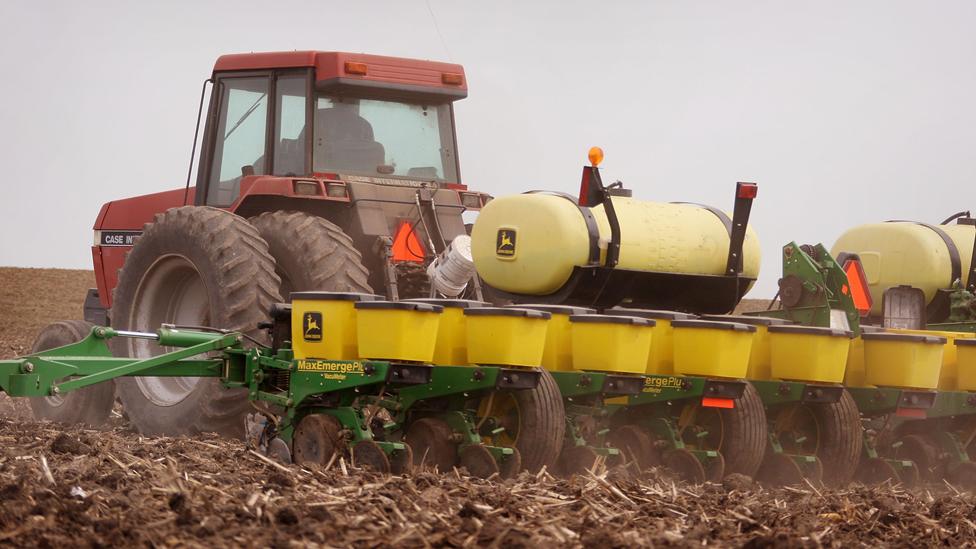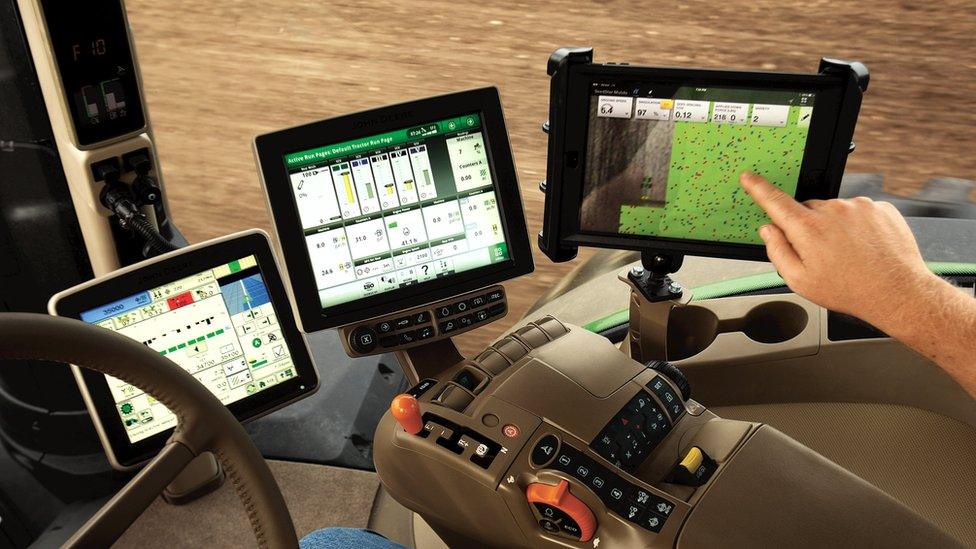Navigating the Internet of Things - by tractor
- Published
- comments

It's now almost a cliche that the future of the internet is things. According to the research firm Gartner there are already more than six bllion devices connected to the internet, and that will grow to more than 20 billion by 2020.
Too often, though, the Internet of Things (IoT) seems like a vague abstraction - we are told it's a revolution that will change our lives but it's often not clear how. So in today's edition of Tech Tent we explore some practical examples, and we examine the key question of who will own the ocean of data which will flow from all these connected things.
You might not expect a company which makes window blinds to be evangelical about IoT but when we visited the Ecobuild conference in London a firm called Umbra Shading was eager to show us how it was embracing IoT technology. Its motorised blinds for large office buildings are designed to adapt to the conditions outside, opening and closing when they judge more or less light is needed.
"The blinds are intelligently pulling data from the cloud," Umbra's chief executive Nigel Hill explains. That data includes the current and forecast weather. "We hear a lot about big data - what I'm excited about is we're using that for a relatively simple everyday problem like sunshading."
If the construction industry is just getting to grips with IoT technology, the farm machinery giant John Deere has been pioneering its use for years. Its tractors and combine harvesters have been "things" connected to the internet for more than a decade. It is a pioneer in autonomous farm vehicles which can drive themselves to an accuracy of two or three centimetres. This is all part of the precision agriculture revolution which means, for instance, that there's no overlapping when a field is sown with seed or sprayed with fertiliser.
"We're on a journey to get more and more precise," John Deere's Ron Zink tells me. With the world's population set to grow from seven billion to 9.5 billion by 2050, he says, "the challenge is to do more with less and this data-driven agriculture will do that".

Firms like John Deere and Monsanto are now collecting vast amounts of data from their customers, which they say will help other farmers work out how best to manage their land. Zink insists it's clear who is in charge - "the customer controls their data - it's the growers' data" - but as the value of this information grows, we can expect more conflicts over who has the right to share it and manipulate it.
Which is where the Hub of All Things or HAT comes in. This is a social enterprise which aims to create a way of giving consumers something called a HAT, external - a personal data store. Irene Ng, a University of Warwick economist who's one of the leaders of this project, explains to me that we all have more and more data - information on our shopping habits collected by online retailers, our location and health details stored on our mobile phones, and increasingly data collected from the IoT.
"This data that we are giving away is our behaviours. What we are saying is that there is a lot more we can do with it if we take it back and if we can grab some of it back to the HAT we can combine it." She makes the point that companies holding your data aren't allowed to share it with other organisations - but we are. So for instance we could take our spending record with a supermarket and share it with an online retailer. "It's your data - once you've taken it back you could exchange it for discounts and promotions."
It is an intriguing, perhaps revolutionary, idea - but convincing us all that we need to learn how to own and share our data will be a challenge. This week the UK's competition regulator outlined plans to release the data of people who had not switched energy suppliers for three years, to rival energy firms so that they could be targeted with offers.
Immediately, concerns were raised about privacy and the threat that vulnerable people might be spammed with hundreds of emails and letters. It would obviously be preferable if energy users could take control of their own data - and choose to offer it to firms which might give them better deals. The problem is that it's those who most need to save money on heating bills who may be least likely to master this new data era.
Tech Tent is broadcast on BBC World Service at 15:00 GMT - catch up on BBC iPlayer Radioor download the podcast